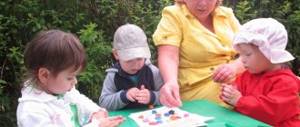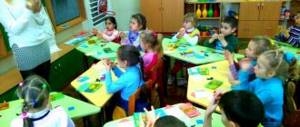Psychological development
Even an outwardly calm and confident child may find it difficult to adapt to an unusual school environment. What is important to teach children to help them transition to a new stage in life?
Teach your child to manage emotions and think positively.
The ability to control emotions such as anger, malice or resentment will protect the child from rash actions or words. Explain to your child that there are many problems. But if you think positively, it will be easier to look at the situation from the other side and find the right way out.
Approach the issue consciously: model different life situations and help your child figure out together what to do in this or that case.
Train your attention and ability to concentrate.
Teach your child to always finish what he starts. Give him tasks that can realistically be completed within half an hour. Choose not only your favorite activities, but also those where your child may resist. If you managed to concentrate on the task at hand for at least 20 minutes and get the job done, you have done it.
Cultivate responsibility and develop willpower.
Teach to dream, set goals and achieve them, despite difficulties. Help with external incentives at first, but explain that the strongest motivation is his own.
Assign your child adult tasks. Let him have his own list of assigned tasks around the house: water the flowers or wipe the dust, walk or feed the pet.
Preparing a child for school. Advice for parents. Memo
Memo for parents on preparing their child for school
The memo can be useful in the work of kindergarten teachers and parents of preschool children. Purpose: can be used by kindergarten teachers as a reminder for parents. Goal: informing parents about preparing their child for school. Objectives: • to help parents in the proper organization of work to prepare their child for school; • improve the pedagogical culture of parents; • arouse parents' interest in the issue of preparing their child for school. 1. What is the basic knowledge that a future first-grader should have? 2. Practical advice for parents. 3. Simple recommendations. Knowledge required for a first grader: 1. Count from 0 to 10 (and in reverse order).
It should be noted that the child must not just “memorize” these numbers: he must be able to apply counting in practice, i.e., relate the number and the object (for example, you can ask the child to count the number of buttons on clothes; ask the child to place so many plates on table, how many people will be dining, etc.).
Thus, the counting process must be conscious. 2. Carry out simple mathematical operations within 10 (add, subtract). 3. Know the names of the basic geometric shapes (circle, square, rectangle, oval, triangle, rhombus) and be able to reproduce them. 4. Know the letters of the alphabet.
The best way to remember them is with the help of associations: A - stork, orange, B - drum, hippopotamus, etc.
5. Know fairy tales, poems, sayings, riddles.
It should be noted that, despite the dominant position of the computer in the modern world, reading is of great importance for the intellectual development of a child.
A child’s communication with a real book, not an e-book, plays a significant role in shaping his inner world. 6. Have a basic understanding of natural phenomena, months and seasons, days of the week. 7. Have basic spatial concepts (right/left, up/down).
At home, you can ask the child to put his right hand on his left ear, and his left hand on his right knee, etc.
While walking around the city together, you can invite your child to describe what is to his right, to his mother’s left, behind the store, etc. 8. Be able to copy from a sample (act according to a model).
You can draw a pattern in a checkered notebook and ask your child to continue it.
9. Be able to classify, generalize, eliminate unnecessary things.
You can invite the child to name it in one word: “apple, pear, orange, plum”;
ask the child to exclude unnecessary things: “dress, coat, boots, trousers.” In both cases, you should be asked to explain your answer. Practical advice for parents. — The future first-grader should be gradually taught to be independent: ask for help in setting the table, cleaning the room, making the bed, etc. During this period, it is very important to follow a daily routine so that your baby gets used to going to bed and getting up at a certain time (this will significantly reduce the likelihood of difficulties in adaptation). — It is also very important that the child knows his exact home address and telephone number, and has basic knowledge of the rules of the road. — When preparing your child for school, try to seek the help of professionals. Remember that your child's cognitive sphere needs professional development. — The main thing in preparing a child for school is to create motivation and joyful anticipation. Remember that when a child comes to school, he changes his social platform. — If you want to study with your child at home, use methodological literature. Remember that pedagogy is a science. — Take care in advance to develop your child’s independence skills. Remember that it will be very difficult for your child at school without them. — Do not try to restrain your child’s emotions when they manifest themselves. Remember that in a younger schoolchild the emotional sphere is more developed than the volitional and intellectual. — If your child likes to engage in artistic creativity, support him. Remember that the aesthetic development of your child will largely determine the development of his personality as a whole. — Read with your child regularly and motivate him to read independently. Remember that mastery of reading techniques will allow your child to master other academic skills. — Get your child ready for school through play. Remember that for a preschooler, play is the leading activity. — Don’t let your child’s viewing of television programs take its course. Dose such views both in time and in content. Try to discuss what you saw with him. Remember that TV has the ability to penetrate and change your child’s mind. - If your child is unsure of himself, it means that somewhere in childhood you missed a moment. Try to turn the situation around. Remember that only creating situations of success and believing in your child will help you. Simple recommendations. Understanding the importance of preparing children for school, we offer recommendations to parents that will help a preschooler calmly move to the next stage of his life. 1. DO NOT POWER YOURSELF WITH NEW INFORMATION. During the remaining time you will not pull up any “tails”. And if you press your child with reading and counting, you can cause negative emotions in him about school. Of course, you can read a little and solve simple examples, but all this should be in a playful, non-forced form. In addition, it is important for preschoolers to read the same books several times. They, recognizing the “material,” try to tell the narrator what will happen next, correcting him if he made an inaccuracy. This develops activity in them, and then it will be absolutely easy for them to express their “adult” opinion already in the first lesson.” 2. TELL POSITIVE STORIES FROM YOUR SCHOOL LIFE. It is important to form a positive attitude towards school in the future student. If a child wants to learn and is sure that school is interesting, then the inevitable stress associated with new rules and daily routine, an abundance of unfamiliar people, will be successfully overcome. To do this, often tell your child funny stories from your school life. 3. DO NOT FOCUS ON GRADES. Many parents make a grave mistake when they start to scare: “Read, otherwise you’ll give me bad marks.” It is important to focus the child’s attention on the learning process (you will learn a lot of new things, you will make new friends, you will become smart), and not on the result of good grades, which are better not to mention at all, especially since they are not given in the first grade. 4. DON'T BE SCARED BY SCHOOL. Under no circumstances should you talk in front of your child that his childhood is “over”, don’t feel sorry for him: they say, poor thing, everyday work begins. Don't even joke about school. You should also not discuss upcoming expenses in front of your child, lamenting the high cost of uniforms or stationery. 5. BUY SCHOOL SUPPLIES WITH YOUR CHILD. You need to buy a briefcase and all school supplies with your child, then he becomes involved in the process of preparing for the first of September. Let the child choose his own pencil case, pens, pencils and rulers, and notebooks with a colorful design on the cover. When you come home, don’t hide your purchases in the closet - give them to your child so that he gets used to things that are new to him. Let him collect a briefcase, carry it around the apartment, lay out notebooks and pencils on the table, then the teacher’s simple instructions: “Get a red pen or a lined notebook” will not cause difficulties for the child: he will clearly know where he has everything. It is also good to take your child to the school of your choice if you have not already done so. Take a walk near the school. This way the baby will get used to the new place faster. 6. PLAY SCHOOL. Let all your child’s toys go to first grade, and let his favorite one become a teacher. In such a game, you can explain the basic school rules: how to sit at a desk, how to answer in class, how to ask to go to the toilet, what to do during recess (15-minute “lessons” should alternate with five-minute “recess”). 7. START LIVING WITH A NEW DAILY ROUTINE. A month before school, you need to smoothly adjust your daily routine to the new routine. Try to ensure that your child goes to bed no later than ten in the evening and gets up at 7-8 in the morning. It is very important to formulate in your child an idea of what needs to be done in the morning and in the evening. To do this, it is good to use a cork or plastic board on the wall, where you can attach pieces of paper, write, or draw. 8. MAKE YOUR BABY FRIENDS WITH A WATCH. A skill needed for school is time orientation. If your baby doesn't know what time it is yet, teach him this. Many children find it easier to navigate using an electronic clock. The baby should know what a quarter of an hour, half an hour, in an hour means. Hang a large clock in the nursery (any clock, as long as the child can tell the time by it). While reading, playing or eating, you can put a clock on the table and draw the child's attention to what time the activity began and what time it ended. 9. MORE TEAM GAMES. At school there are rules that must be followed: sit at your desk, stand up when the teacher allows, do not shout. Without understanding these elementary laws, it will be difficult for a child in 1st grade. To develop your child’s ability to obey and play by the rules, use team games. Thanks to them, the child will learn that there are rules that must be followed, and that the result depends on this. Another important lesson that team games teach a child is a calm attitude towards losing. 10. TRAIN YOUR ATTENTION AND MEMORY. A good game for attentiveness: everyone is given the same text, the time is checked, and you need to find and cross out the letters “c” as quickly as possible. Conduct “classes” first for 10 minutes, the next 15, bringing the “lesson” time to the same duration as it will be at school. Then the child will not be so frightened by endless half an hour of classes. You can also play “Turn around and name it” more often. Place toys on the table and let the child look at the table for 1 minute. Then he turns away and names the toys lying on the table. Make the task more difficult: add toys, reduce the time for memorization. You can replace the toy with another one - the child, turning around, must tell what has changed. Good luck to you and have more faith in yourself and your child’s capabilities!
We recommend watching:
Raising interest in school in children of the preparatory group. Memo for kindergarten parents. Teaching literacy to children 5-6 years old. Advice for parents of future first-graders.
Similar articles:
Learning the alphabet with preschoolers in kindergarten
Children's perception of information
Fatigue and overwork in preschool children
Educational coloring books for children from 3 to 5 years old
Excursion for preschoolers to school
Intellectual development
Your child will be taught to read, write, count and solve simple mathematical problems at school. The most valuable thing parents can do for their children is to teach them to think correctly, reason, analyze information and see the main thing.
What exactly needs to be done?
1. “ignite” cognitive interest
and stimulate them to learn new things: in books, videos, at home and on a walk. Organize a variety of leisure activities for your child so that they understand how much new and interesting things there are in the world that they have to learn about.
2. Develop speech and communication skills.
Teach your child to find a common language with peers and adults. It is important to teach the ability to listen, argue your point of view and enjoy the communication process itself.
3. Develop logical thinking.
Your child will learn to solve typical problems in mathematics lessons. But in order for him to successfully cope with tasks with an asterisk and everyday tasks, one cannot do without the ability to reason and think outside the box. These abilities can and should be trained.
How?
For this purpose, you need to regularly perform non-standard tasks and solve logic problems. Additional benefit: the child develops perseverance and the habit of finishing what he starts. Read more about how and why to develop logic.





